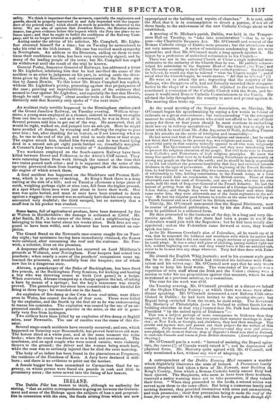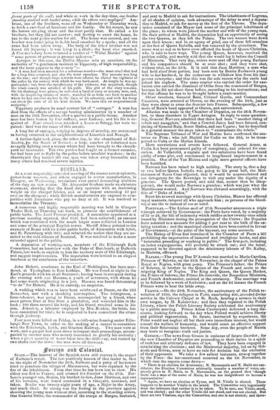IRELAND.
The Dublin Pilot has reason to think, although no authority for stating, "that an active cbrrespondence is going on between the Govern- ment and some of the Bishops upon the subjects of leases and perpetui- ties in connexion with the sees, the funds arising from which are now appropriated to the building and repairs of churches." It is said, adds the Mail, that it is in contemplation to divert a portion, if not all of those funds, to the endowment of the new Catholic College about to be established.
A meeting of St. Michan's parish, Dublin, was held in the Temper- ance Hall on Tuesday, to "take into consideration "—that is, to op- pose—the Charitable Bequests Act. Mr. O'Connell and several of the Roman Catholic clergy of Dublin were present ; but the attendance was not very numerous. A series of resolutions condemning the act were agreed to; and then Mr. O'Connell made a long speech against it. He began by a profession of unlimited submission to his Church— There was not in the universal Church of Christ a single individual more submissive to the authority of the Church than he was. He publicly acknow- ledged his submission to the Supreme Head of the Church [the Pope] and the Hierarchy according to their different but exalted positions. If asked what he believed, he would say that he believed " what the Church taught " ; and if asked what the Church taught, he would answer, All that he believed." (!)
He went on to attack the act ; regretting that the majority of the Bishops, who disapprove of it, had not formally recorded their disappro- bation in the shape of a resolution. He objected to the act because it sanctioned a connexion of the Catholic Church with the State, and be- cause it would send Roman Catholic Commissioners to the Castle. He advised the laity throughout the country to meet and protest against it The meeting then broke up.
At the usual meeting of the Repeal Association, on Monday, Mr. O'Connell began his speechmaking by saying a few words in favour of railroads as a great convenience ; but recommending "in the strongest manner he could, that all persons who could not afford to be out of their money for three or four years should be most cautious in embarking their money in railway speculations." His next task was to reply to a letter which he read from Mr. John Augustus O'Neill, defending France from his attacks on the score of irreligion and immorality— He had never said that all France was irreligious and immoral ; but he could not think that France, in the present day, was religious and moral. There was a powerful party in that country violently opposed to all who were religiously disposed. The Government were irreligious, and they were introducing laws to prevent the religious education of the people. But still there were in France both Catholics and Protestants of high religious principles. He knew the many fine qualities that were to be found among Frenchmen as prominently as among any people on the face of the earth; and be should be basely ungrateful if be did not recollect the generous hospitality that they had extended towards Irishmen in the ages of persecution. At the beginning of the French Revolu- tion, he had himself no less than fifty-two cousins, all within the third degree of relationship to Lim, holding commissions in the French Army, at a time when they could hold no commission in the British service. Three of these afterwards rose to the rank of Generals; and one of them, who was his own uncle, held the rank of Inspector-General of the French Infantry. He had the honour of getting from the King the command of a German regiment called S ilem Salem; and though tbey were but an undisciplined mob when they came under him, they were afterwards one of the finest regiments in the ser- vice. He had the singular good fortune to receive at the same time full pay as a French General and as a Colonel in the British service.
Thirdly, Mr. O'Connell announced that the Repeal Dictionary, now in course of periodical publication, was by his son John, and would soon be published in a collected form.
He then proceeded to the business of the day, in a long and very dis- cursive speech. He said that there had been a pause to see if the Federalists would join with the Repealers ; but be had been totally dis- appointed: unless the Federalists came forward at once, they would speak too late— As for Mr Sharman Crawford's plan of Federalism, all he would say of it was, that he respected the boldness and manliness with which its author had come forward, but that it did not contain a single sentence or proposition that he could adopt. It was a sober dull piece of plodding, having neither right nor left, neither beginning nor end; and they would leave it like an unlicked cub, never to be formed into any shape whatever. They had then done with Fede- ralism.
He abused the English Whig journals ; and in his coarsest style gave the lie to the Examiner, which had ridiculed his dalliance with Fede- ralism and his velvet cap : Mr. O'Connell now says that he only wears the cap to keep his head warm. The remainder of his speech was a repetition of trite stuff about the Irish and the Union ; closing witu a motion to refer his ten propositions against that measure, which he had introduced at a previous meeting, to a committee.
The rent for the week was 493/.
On Tuesday evening, Mr. O'Connell presided at a dinner on behalf of the Orphan Charity Society ; at which there was some racy after- dinner speaking. Mr. O'Connell denounced a new Reform Club esta- blished in Dublin : he had been invited to the opening-dinner ; but Repeal being excluded from the toasts, he staid away. The Reverend Mr. Moriarty of Philadelphia (now in Ireland to collect funds for re- building churches in that city) boasted that Mr. Polk had been elected President " by the united spirit of Irishmen "— This was a subject perhaps of more consequence to Irishmen than they
imagined; for they had for the last two years their monster meetings in Ame- rica; at New York, at Georgia, and elsewhere, they had their meetings. The priests and laymen met, and poured out their prayers for the welfare of this country. Forty thousand IriAmen in America—and they were still alive— were pledged, the moment that one drop of Repealer's blood was shed in Ireland, to rush into Canada and rescue it from British dominion. (Loud and prolonged cheering.)
Mr. O'Connell put in a word : "instead of assisting the Repeal agita- tion, the rescue (0 of Canada would retard it "; and he deprecated all physical force. Mr. Moriarty quite agreed with Mr. O'Connell, and only mentioned a fact, without any view of adopting it.
A correspondent of the Dublin Evening Mail recounts a murder which frightfully illustrates the state of Ireland. A Protestant family named Shepherd had taken a farm of Mt Fawcett, near Batliboy in King's County, from which a Roman Catholic family named Daly had been ejected. The Shepherds, who seem to have been three brothers, received a notice warning them not to take possession, if they valued their lives. " When they proceeded to the lands, a second notice was served upon them to the same effect. But being a numerous family and nothing daunted, they provided themselves with arms and ammunition, and took possession ; their first precaution being to make the roof of the house fire-proof outside wi h clay, and then boring gun-holes through dif- ferent parts of the wall; and while at work in the day-time, one brother standing sentinel with loaded arms, while the others were employed." Am- brose, one of the brothers, went off on Wednesday or Thursday week, to fetch a cart-load of furniture and his family. On his return, he saw the horses straying about and the door partly shut He called o his brothers, but they did not answer ; and fearing to enter the house, he ran to the next police-station for aid. The house was entered, and one brother was found lying in it, his head smashed by a spade ; and all the arms had been taken away. The body of the other brother was not found till Saturday : it was lying in a ditch ; the head also smashed. A Coroner's Jury have returned a verdict of "Wilful Murder" against "some person or persons at present unknown."
Apropos to this case, the Dublin Monitor tells an anecdote, on the authority of " a gentleman resident in Tipperary, of high respectability, and the most popular in the county "—
" A man had been arrested for a notorious murder—the most cruel that had for a long time occurred, and also the most causeless. The assassin was long on the run ; and though large rewards were offered, he eluded the vigilance of the police by the secrecy with which he was harboured. At length be was ap- prehended; but, from the insufficiency of the evidence, was acquitted, though the whole county was satisfied of his guilt. The gist of the story remains. On his discharge from prison, he collected a band of sixty or seventy men, and, with the inspiriting strains of music, marched them from one farm to another where be had received shelter in the daj it of his adversity, and with his troop cut don° the corn of all his kind friends. We have this on unquestionable authority."
Tipperary produces its usual current list of " outrages." A man has died from the effects of a savage beating administered by a number of men on the 19th November, after a quarrel at a public-house. Another man has been beaten by four ruffians, near Lisbony, and his life is de- spaired of. Four armed men attacked a house at Scragg, but were re- pulsed : land was the cause of this assault.
A long list of outrages, varying in degrees of atrocity, are announced as having occurred in the neighbourhood of Limerick and Nenagh.
A faction-fight took place, the other day, in the churchyard of Bal. iinaltig, lin the South of Ireland ; a large number of infuriated men savagely fighting over a corpse whim' bad been brought to the church- yard for interment. The two parties had fought on a former occasion, but had been put to flight by the police before mischief was done : in the churchyard they battled till one man was taken away insensible and many others had received severe injuries.



























 Previous page
Previous page